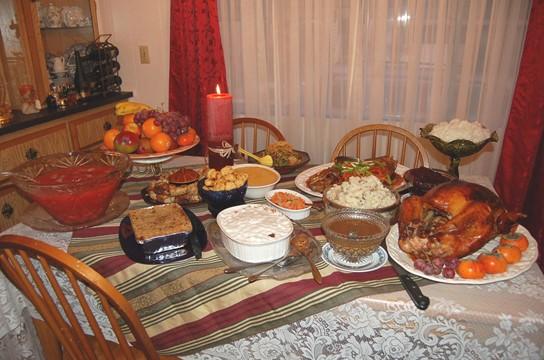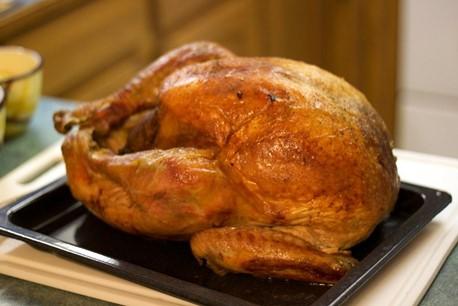
4 minute read
The Turkey About Thanksgiving
November brings us a one-of-a-kind holiday, Thanksgiving. On this day, traditions are made or followed, such as watching any of the parades (the Macy’s Thanksgiving Day Parade, for example), meeting with a lot of family members that you may not have seen in a while, and even having a huge feast. This get-together is a time for celebration and family, which creates a positive atmosphere in some cases. Yet, this celebratory time has hidden implications that have a greater chance of being negative. These implications are not only on the individuals celebrating the festive holiday, but also on the environment. In addition, this specific holiday creates a societal norm, such as abundance, which acts as a confounding factor for both the individuals and the environment. Although Thanksgiving brings a time of joy through family and traditions, the societal norm, “overindulgence” or “abundance” - in terms of consumption - hinders the health of the individuals participating in this holiday, as well as the environment, because of the lack of seasonality. Abundance is a problem that is often overlooked on holidays because the abnormal increase in consumption has become an accepted social norm in communities. However, this accepted norm has harmful effects on an individual's health. According to “We-Gather Together”: Consumption Rituals of Thanksgiving in the
By Jamie Cohen
Journal of Consumer Research, “Thanksgiving Day is a collective ritual that celebrates material abundance enacted through feasting” (Wallendorf, M. & Arnould, E. J.). The Thanksgiving Day holiday is a plethora of many different traditions, but feasting, or eating, is a primary aspect. In looking at the directlystated term, feasting, there is more to be said about the food culture that drives this holiday. Feasting does not necessarily have the same definition as eating. Feasting correlates to an overabundance of food, while eating can simply just mean a single meal. This overabundance of food can have serious effects on the participant's health. In “The effect of the Thanksgiving Holiday on weight gain” by Holly R. Hull and others, they state, “In conclusion, we found over the holiday an increase of .5 kg in body weight” (Hull, et al.). Although this may seem like a trivial amount of weight, considering the short time frame, this is troublesome, since previous research suggests weight gained during holiday periods is retained” (Yanovski, et al.). Holiday weight is a starting point in weight gain that has the potential to lead to serious health implications in the future, and a reason for this can be because of the development of bad habits that are culturally acceptable during the holidays. No matter the holiday, the perception leads to over-abundance of
food and treating the holidays as a time for treat meals - and since all of the holidays come every year, it can add up a lot. Even though the over-consumption of food on Thanksgiving has the potential to lead to bad eating habits, Thanksgiving also has environmental implications as well. According to “We-Gather Together”: Consumption Rituals of Thanksgiving in the Journal of Consumer Research by Melanie Wallendorf and Eric J. Arnould, “Thanksgiving Day is read as an enacted document orchestrated symbolically and semiotically through consumption” (Wallendorf, M. & Arnould, E. J.). Consumption has a plethora of definitions and meanings, and as the previous paragraph discussed, food is one of them.
However, food has more serious implications that do not have to do with the health of an individual, but the health of the environment. In the article, “The 100-Mile Thanksgiving: What is the ecological footprint of your Thanksgiving Dinner”, Timothy Beatley states, “But it’s also a sign of the times — of a strengthening local food movement, of the desire to regain some control over what we consume in a globalized world, maybe even of renewed appreciation for the solid pleasures of friends and family in a world of fragile job markets and unreliable stock portfolios” (Beatley, T). Locality and seasonality are two terms that are not often used when discussing Thanksgiving. Because of the essentials for a Thanksgiving meal, such as turkey, cranberry sauce, and even cornbread, the meals can create a big ecological footprint. However, just starting to switch to a local Thanksgiving meal is not an easy task since a) people want the foods they want, and b) some people do not have access to local, fresh farm foods. Therefore, Thanksgiving can have a huge effect on the environment in terms of the foods used in the overconsumption, which does not have an easy solution at the moment. Overall, Thanksgiving Day has the possibility of hindering not only the participant’s health, but the environment’s health. This article is not to denounce the holiday, but rather inform. People should still celebrate the holiday as they want, but if they choose to, they have the possibility to make minor changes until they are ready for a bigger change. Thanksgiving is not only a huge holiday for Americans, but the aspects of this holiday (such as overconsumption) have become a cultural norm. Therefore, this article seeks to spread awareness about Thanksgiving and show that even a positively publicized event, can have negative implications.

Works Cited Beatley, T. (2009). The 100-Mile Thanksgiving. PlacesJournal. Hull, H. R., Radley, D., Dinger, M. K., & Fields, D. A. (2006). The effect of the Thanksgiving holiday on weight gain. Nutrition journal, 5(1), 29. Wallendorf, M., & Arnould, E. J. (1991). “We gather together”: Consumption rituals of thanksgiving day. Journal of consumer research, 18(1), 13-31. Yanovski JA, Yanovski SZ, Sovik KN, Nguyen TT, O'Neil PM, Sebring NG: A prospective study of holiday weight gain. N Engl J Med. 2000, 342 (12): 861-867. 10.1056/ NEJM200003233421206.










